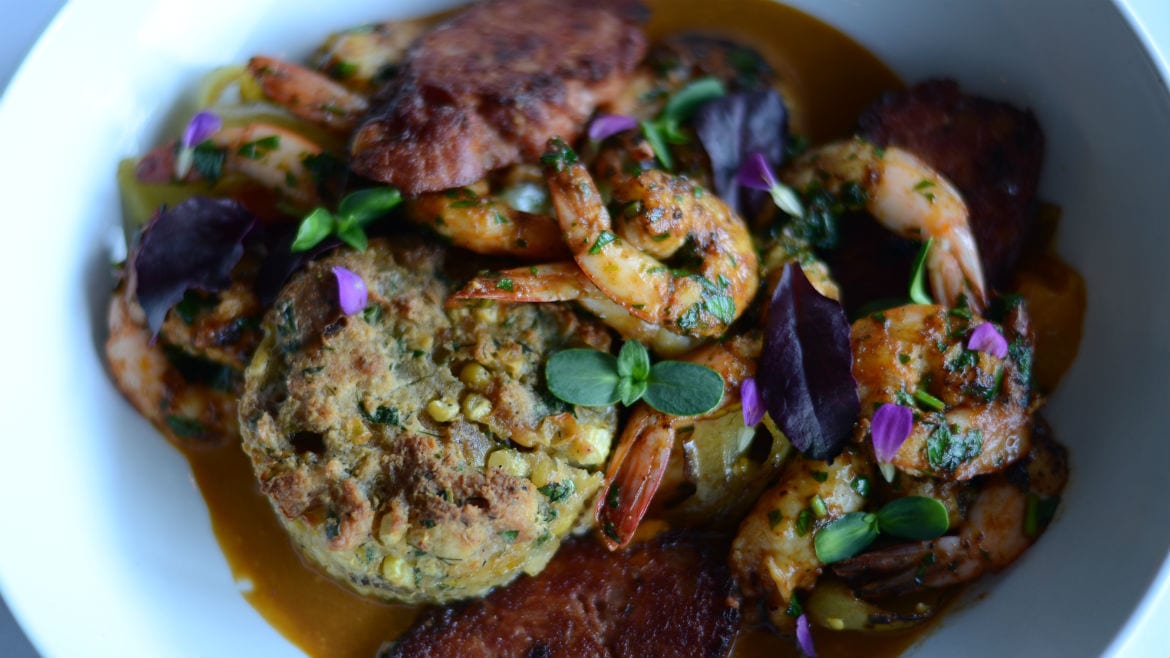Fresh, Live Shrimp Find Unlikely Home in Oak Grove, Missouri
 Room 39 is one local business using farm fresh shrimp from KC Shrimp Co. in Oak Grove, Missouri. This dish, also called “KC Shrimp,” is sautéed shrimp with andouille sausage, sauce étoufée, cherry tomatoes, banana peppers, and ground cherry and corn pudding. It was prepared by chef Jamie Aragonez. (Photo: Austin Kuehl I Flatland)
Room 39 is one local business using farm fresh shrimp from KC Shrimp Co. in Oak Grove, Missouri. This dish, also called “KC Shrimp,” is sautéed shrimp with andouille sausage, sauce étoufée, cherry tomatoes, banana peppers, and ground cherry and corn pudding. It was prepared by chef Jamie Aragonez. (Photo: Austin Kuehl I Flatland)
Published July 25th, 2016 at 3:00 PM
“Wow!”
It’s a comment Mitch and Julie Schieber hear whenever somebody views their KC Shrimp facility for the first time. Inside, eight 14-foot above-ground swimming pools are filled with 80-degree saltwater and thousands of live shrimp. Snaking across the low ceiling, and into each pool, are blue plastic lines that pump air into the water and red lines that create a radiant heat system.
“It’s cool to have people come in here,” Julie Schieber said. “It’s higher quality [shrimp, in terms of] taste and health.”
The Schiebers received their first batch of live shrimp in February and started selling them mid-May. The shrimp mature on site and are then sold at four different sizes or ages. Current restaurant customers include Novel, The Rieger Hotel Grill & Exchange and both locations of Room 39. For individuals looking for fresh shrimp, it’s an appointment-only schedule or via occasional pop-up events.
Purchased live, with their heads on, the shrimp die on the way to their destination. Cooking these shrimp with the heads on allows fat stored near the heads to infuse the “meat” with additional flavor. The shrimp taste fresh and mild.
“It’s incredibly rewarding to see the excitement on people’s faces, who understand how our shrimp are different from what has previously been available,” Mitch Schieber said. “People who grew up in coastal states eating fresh shrimp, and chefs who want to buy fresh head-on shrimp really appreciate what we are doing.”
After Mitch helped one of their children with a school project to raise brine shrimp, he learned that aquaculture ranked No. 1 on a list of top new businesses. He grew up on a farm and previously did remodeling, but he wanted to do less physical work. Then the Schiebers found RDM Aquaculture LLC, one of only a few privately owned shrimp farming companies in the U.S., at that time.
RDM has become their supplier and consultant, providing information about how to use a specialty saltwater system inside their pools.
Although some natural evaporation occurs, Julie says 99 percent of the pool water is reused; the water’s brackish quality reflects the couple’s use of an industry probiotic. This aquaculture application is designed for shrimp and fish hatcheries to combat pathogenic bacteria and virtually eliminates wastewater.
The Schiebers spend approximately 20 hours per week monitoring water quality and feeding the shrimp protein-rich food twice each day. Mitch plans to eventually work in the business full time, but he currently juggles KC Shrimp demands with a different full-time job.
“The uniqueness is what drew me into this,” Mitch Schieber said, “and the whole freshness [aspect].”
Once a month, he drives 10 hours to RDM with a sturdy insulated tank in his pickup flatbed. While there, he retrieves approximately 10,000 fresh, white saltwater shrimp. During the return trip, Mitch pumps oxygen into the saltwater tank, which puts the shrimp in a less active state through the long drive back to the Kansas City area.
“Starting this business has definitely been a lesson in patience,” Julie Schieber said. “We have to wait months for the shrimp to grow. We have to wait at least a year for our bacteria to mature so our survival rates will be consistent. Every day it seems like there’s something new to be excited about, and yet some days there’s a new frustration.”
Lisa Waterman Gray writes about fascinating food purveyors for KCPT’s Flatland and visited hundreds of restaurants while doing research for her travel book, An Explorer’s Guide: Kansas.


